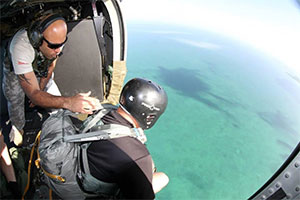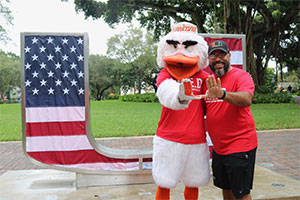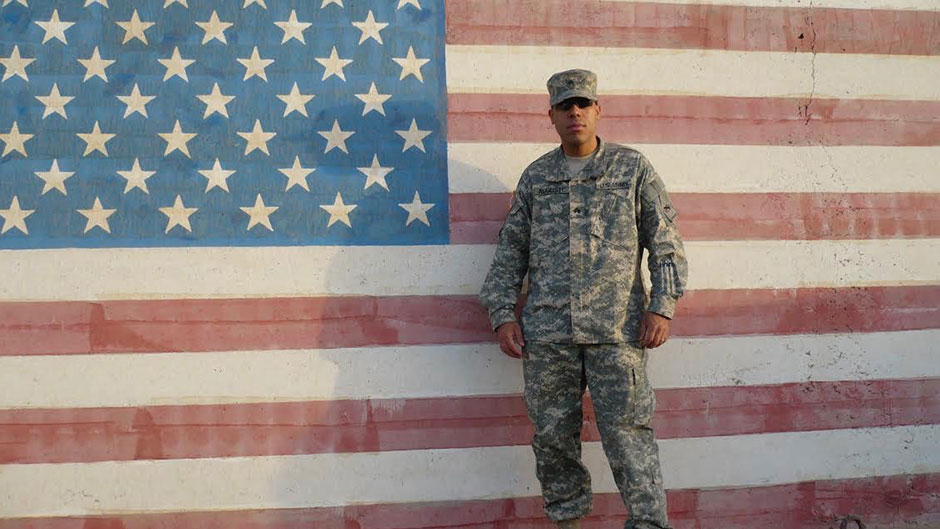After 11 years in the U.S. Army, Derek Auguste was looking forward to unpacking his bags and being home with his family, to going back to college, and to moving forward with his life.
He expected, of course, that there would be challenges. But what Auguste did not know was just how tough the transition to civilian life would be, or that he would eventually find hope–and healing–through giving back and pursuing a lifelong dream of attending the University of Miami.
Auguste was born in Brooklyn, New York, but moved to Miami when he was a kid. He grew up a Miami Hurricanes fan with his fondest childhood memories revolving around football games and the Orange Bowl.
Following high school, Auguste started college but dropped out. And after a series of corporate and sales jobs left him unfulfilled and lost, he decided to enlist in the army. He hoped that the structured environment would provide the discipline and perseverance he needed to succeed and care for his family.
 It did more than that. It provided a sense of purpose as he embarked on a career that took him across the world in service of his country. And though the pressure was near constant, whether he was setting up audio equipment for conferences across Iraq, coordinating parachuter jumps, or providing relief in Haiti following a devastating earthquake, Auguste thrived.
It did more than that. It provided a sense of purpose as he embarked on a career that took him across the world in service of his country. And though the pressure was near constant, whether he was setting up audio equipment for conferences across Iraq, coordinating parachuter jumps, or providing relief in Haiti following a devastating earthquake, Auguste thrived.
When he retired in 2015, he enrolled in Miami Dade College. It was easy at first, the excitement of being out the military still fresh. But as time went on, reality began to set in. “You go from having this sense of purpose and constant pressure, of ‘go, go, go’ in the military, and then to the civilian side, where it’s not as rigorous,” Auguste says. “And your mind begins to calm down, and you’re just not used to that anymore.”
The new calmness unsettled him, and he was forced to deal with emotions and pain he didn’t understand. He struggled with the notion that he wasn’t performing enough and, with no clear-cut plan ahead, Auguste started to question his decision to leave the army. “By the sixth month out of the military,” he says. “I felt things start to crumble around me – physically, emotionally, and mentally, and I spiraled into a deep depression. I didn’t know how to get out of it or where to turn to for help."
He decided to take time off from school to focus on his health. “It was about figuring out how to operate in this new normal,” he says. “I needed to learn how to be a better version of myself in this new state. In the military, I was a leader, hard charger, the person you called when you needed to get something done no matter what. I had to reframe that identity.”
He found support through veterans’ service organizations like The Mission Continues, which empowers veterans to continue their service, and United Way of Miami-Dade’s Mission United, which gave him a platform to share his story and experience of transitioning with other veterans.
He became actively involved in community service, working on various projects, like cleaning a park on a Saturday morning or building an outdoor classroom. “Through just giving of my time and myself to these projects, I started seeing glimmers of that version of me that got things done,” he says. “And that was really fulfilling.”
It also allowed him to reconnect with his family and to create shared experiences and memories. “Getting involved in the community together helped us to start building these bonds and figuring out our relationships,” Auguste says.
And so, in the same way that serving in the army had helped him find purpose and drive, serving his community was providing the healing he needed to move forward.
But there was still an important step left—a dream still unfulfilled—attending the University of Miami. Encouraged by his wife and Juan Montoya, A.B. ’19, then the president of the Veterans Student Organization at U, Auguste finally applied. “Going to the U was always the goal,” he says. “I didn’t always know how I would get there, but it was the goal. And when I got accepted, I was floored, I couldn’t believe it.”
He hit the ground running and built a new support system on campus. He found connection and mentorship through the Veterans Student Organization and got involved in a number of programs on campus including the Butler Center Leadership UMiami and Empower Me First. He opened himself up to his classmates and, though he worried about being older than most, he found a warm welcome. In turn, he was able to guide them through tough experiences.
His senior year, Auguste, who had always loved mentoring young soldiers in the army, became a project coordinator for the Freshman Leadership Council, guiding groups of first year students through projects. “I wanted to share the lessons I had learned about leadership, perseverance and even things like project management, that I learned in the army,” he says.
Finally, as president of the Veteran Student Organization, he was a staunch advocate for the veteran community at the U. He even managed to turn the U statue into the American flag during Veterans Week and worked with Hurricane Productions to put together the Homecoming Heroes event, which brought students together to produce care packages to send to deployed servicemembers.
“Getting to the U was the realization that dreams can come true,” he says. “It was everything I could have ever imagined, and then some.”

Auguste now works as an alumni engagement and outreach fellow for the Warrior-Scholar Project, an organization which empowers servicemembers as they transition from the military to higher education. He is a member of Iron Arrow, the highest honor attainable at the University of Miami, and plans to continue to support the veteran community at the U.
“I spent a lot of time reflecting on my own experience transitioning so that I could be an asset to fellow veterans who might be in different phases of their transition,” he says, “So that I can say ‘I understand where you are, let me share how I got through it.’”

